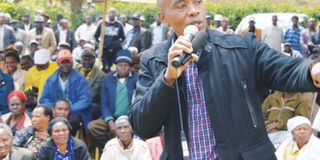Daggers drawn over disputed land

Kiambu Senator Kimani Wamatangi at a past function. The senate committee on Budget and Finance will on Monday hold public consultative meetings in Kiambu over levies which have continued to spark protests in the county. PHOTO| ERIC WAINAINA | NATION MEDIA GROUP
What you need to know:
During President Mwai Kibaki’s regime, Mr Muiri said the members returned in 2005 and resumed farming activities but were evicted.In 2011, the local community got a temporary order barring Utheri Wa Lari members from conducting activities on the land but the members successfully appealed and the order was thrown out last year.
“Since then, we have never been allowed to settle on the land. Any time we visit, we are attacked,” he said, adding that they believe that the local community is being incited and financed by a few individuals who have grabbed the land and are already farming on it,” he said.
In 1974, Mr Stephen Muiri and over 20,000 other people from Kiambu County came together under the company Utheri wa Lari with the objective of purchasing a piece of land.
Mr Muiri, who is the company’s chairman, said after nine years of members contributing small amounts, they raised Sh32.5 million which saw them secure a 22,000-acre peace of land in Mai Mahiu, Nakuru County.
And like any other savvy investor, Mr Muiri said they quickly settled on the land which was previously owed by an expatriate and began farming.
The first group, he said, settled on the land in 1988 after demarcation by surveyors and the issuance of title deeds.
“We were very happy because we had finally secured a home as a majority of us were landless,” Mr Muiri said.
However, their entry in to the land which the had been bought from Kedong Ranch sparked a controversy which has been a center of heated court battle pitting them against the local community.
It also became a cause of clashes, with the local community — who claim the land is ancestral and was never sold to the company — occasionally attacking the members, killing a number of them.
When ethnic clashes erupted in 1992, arsonists burned their houses and stole property. They were forced to seek refuge elsewhere as internally displaced persons.
“We set up Utheri wa Lari Market and built two primary schools. Ewaso Primary School was demolished after the 1992 clashes but Utheri wa Lari Primary School still exists as evidence that we had settled on the land,” Mr Muiri said.
During President Mwai Kibaki’s regime, Mr Muiri said the members returned in 2005 and resumed farming activities but were evicted.In 2011, the local community got a temporary order barring Utheri Wa Lari members from conducting activities on the land but the members successfully appealed and the order was thrown out last year.
“Since then, we have never been allowed to settle on the land. Any time we visit, we are attacked,” he said, adding that they believe that the local community is being incited and financed by a few individuals who have grabbed the land and are already farming on it,” he said.
GENUINE TITLE DEEDS
In a ruling by Justice Roseline Wendo, the court observed that the company had indeed bought the land and their title deeds were genuine but the locals would not allow them back.
“They (local community) could not give any proof of the land’s ownership and later moved to a Nakuru court on the same matter without acknowledging that a court had issued judgment. We have filed our defense and the matter is still on,” their lawyer, Mr Odiwuor Kenyatta said.
Two months ago, George Ngugi and Peter Kibuja were killed and several others injured during a meeting at the disputed land. About 800 members had toured the land when they were attacked by machete-wielding morans.
Kiambu senator Kimani Wamatagi has promised to pursue the matter through all constitutional and legal processes to ensure justice prevails. The senator blamed government officials in Nakuru County for the unending wrangles, saying they have been reaping from the dispute by collecting bribes from the interested parties.
“It is unacceptable that people have title deeds but they are not allowed to reside on their land thanks to a few individuals. The government must deal decisively with them,” Mr Wamatangi said.
He said it was unacceptable that some individuals were trying to take land away from legitimate owners who have ownership documents.
He also said he had raised the matter with the Interior Cabinet Secretary Joseph Nkaiserry, the Director of Public Prosecution Mr Keriako Tobiko and the Deputy Chief Justice Kalpana Rawal with a motive of getting legal remedial measures.
He asked the Ministry of Lands and the National Land Commission to intervene and have the matter put to rest.
But the local community, led by Mr Joseph Ole Kiseu, said the land was never sold to Utheri wa Lari and maintained that they obtained it fraudulently.
According to Mr Ole Kiseu, the land belonged to their ancestors, and termed the move to take it away from them as a historical injustice which they are not ready to see it happen.
In February this year, a Nakuru court ordered members of a company claiming ownership of an 18,000-acre land in Mai Mahiu to keep the peace with the local community pending the hearing and determination of case filed by the community.
This is not the only controversy pitting the Maasai and new land owners over what the Maasai believe is ancestral land.
In 2010, the government’s move to resettle 800 internally displaced persons in the 2,000-acre Rose Farm in Mau Narok was vehemently opposed as the land is subject to a suit filed by the community over land injustices committed against them by the colonial government and the late President Jomo Kenyatta’s regime.





